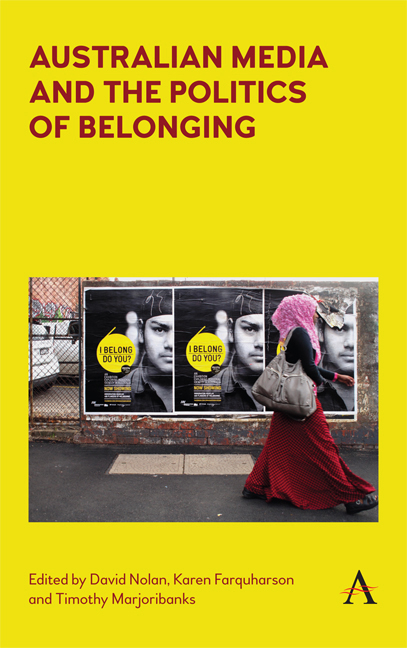Book contents
- Frontmatter
- Contents
- List of Illustrations
- Acknowledgements
- Part I THEORIZING BELONGING IN CONTEMPORARY AUSTRALIA
- Part II SUDANESE AUSTRALIANS, MEDIA PRACTICES AND THE POLITICS OF BELONGING
- Chapter 4 Talking about the Other: Sudanese Australians and the Language of Difference on Talkback Radio
- Chapter 5 In a Context of Crime: Sudanese and South Sudanese Australians in the Media
- Chapter 6 Journalism Practice, the Police and Sudanese Australians
- Chapter 7 Constructing the Heroic Other and ‘They Always Asked about Africa, They Never Asked about Me’: Three Screen Representations of Sudanese Australians
- Part III SHIFTING THE POLITICS OF BELONGING: MEDIA INTERVENTIONS AND POSSIBILITIES FOR TRANSFORMATION
- Notes on Contributors
- Index
Chapter 5 - In a Context of Crime: Sudanese and South Sudanese Australians in the Media
from Part II - SUDANESE AUSTRALIANS, MEDIA PRACTICES AND THE POLITICS OF BELONGING
Published online by Cambridge University Press: 21 June 2018
- Frontmatter
- Contents
- List of Illustrations
- Acknowledgements
- Part I THEORIZING BELONGING IN CONTEMPORARY AUSTRALIA
- Part II SUDANESE AUSTRALIANS, MEDIA PRACTICES AND THE POLITICS OF BELONGING
- Chapter 4 Talking about the Other: Sudanese Australians and the Language of Difference on Talkback Radio
- Chapter 5 In a Context of Crime: Sudanese and South Sudanese Australians in the Media
- Chapter 6 Journalism Practice, the Police and Sudanese Australians
- Chapter 7 Constructing the Heroic Other and ‘They Always Asked about Africa, They Never Asked about Me’: Three Screen Representations of Sudanese Australians
- Part III SHIFTING THE POLITICS OF BELONGING: MEDIA INTERVENTIONS AND POSSIBILITIES FOR TRANSFORMATION
- Notes on Contributors
- Index
Summary
Introduction
This chapter examines how Australian newspapers and television news programmes represented Sudanese and South Sudanese peoples in Australia between 2007 and 2012. People from the former Sudan (including the current nations of Sudan and South Sudan), began coming to Australia in large numbers in 2000, most often as refugees through the Australian Humanitarian Programme. Through a longitudinal content analysis of print and television news items over a six- year period (2007–12), this chapter analyses how this group was represented in Australian news media. Our findings highlight an overwhelming preponderance of coverage focused on Sudanese Australians in the context of crime, whether framed as perpetrators or as victims. In considering the significance of this, we contextualize media coverage within what we discuss below as Australia's contemporary racial formation (cf. Omi and Winant 2015), and consider how crime and violence have been positioned as products of a problematic ethnic ‘otherness’ that stands as anathema to a pre- existing, and assumedly ‘white’, ‘way of life’. Such positioning, we ultimately argue, can be understood as an effective mechanism of ‘symbolic containment’ that serves to sustain and extend racial inequality. However, we begin outlining our theoretical approach to ‘race’ and racialization before turning to consider the broader sociopolitical context in which a growth in Australia's Sudanese population occurred, and in which Sudanese Australians became a focus of media attention.
Racial Formation and ‘Racialization’
The question of how to understand race, ‘racialization’ and racism represents a highly contested ground, in which theoretical debates have been influenced by, and have reciprocally informed, public and policy discussion. In drawing on the model of ‘racial formation’, our discussion is informed by Michael Omi and Howard Winant's (2015) contention that, although the idea of ‘racial types’ as a theoretical basis for categorization is today widely discredited, race nevertheless persists as a significant discursive basis of a politics of belonging that intersects with, but is irreducible to, other modes of identity categorization (inter alia, class, gender, age, sexuality, religion, nationality and ethnicity).
- Type
- Chapter
- Information
- Australian media and the politics of belonging , pp. 85 - 104Publisher: Anthem PressPrint publication year: 2018

